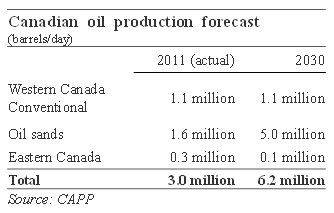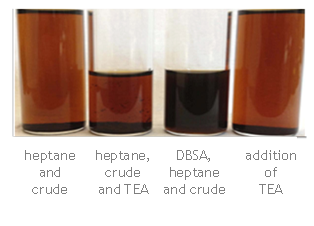Research at RERI: Nano-particles and Molecular Dissolution in Flow Assurance and Drastic Property Changes
Functionalized molecules are expected to drastically alter the aggregation and dissolution of species
in complex fluids such as oil and natural gas. We are taking advantage of the effectiveness of functionalized molecules
to change the properties of hydrocarbon fluids to facilitate production and transport. The goals of
our work in this area include:
• Asphaltene colloidal stability in crudes
• Molecular dissolution of asphaltenes in crudes
• Hydrate anti-agglomeration in crudes and natural gas flowlines
• Oil capture from the seabed
• Viscosity reduction by non-thermal methods


We have made major advances in using small amounts of functionalized molecules in the above five areas. Our work includes elaborate experimental research and molecular modeling including molecular dynamics simulations. The cartoons below show some of the major advancements.
|
Gas hydrates are crystalline structures shown below. 
|
• Ice-like crystalline molecular complexes • Form from a mixtures of water and natural gas • Serious problem in most offshore operations |

|

|
| Large gas hydrate plug in a subsea hydrocarbon pipeline. (Image courtesy of Petrobras) |
Deepwater Horizon oil spill, 2010. (Source: Reuters) |
|
|
Molecular Structure of Species Used in Hydrate Anti-agglomeration |
|
Sun, M. and Firoozabadi, A.: "New Surfactant for Hydrate Anti-agglomeration in Hydrocarbon Flowlines and Seabed Oil Capture," J Colloid Interf Sci (to appear, 2013)
|
|
Sun, M. and Firoozabadi, A.: "New Surfactant for Hydrate Anti-agglomeration in Hydrocarbon Flowlines and Seabed Oil Capture," J Colloid Interf Sci (to appear, 2013)
|
|
We have suggested that hydrate anti-agglomeration can be through water-in-oil, oil-in-water emulsion, and through micellar systems. |
Protonation mechanism in asphaltene molecular dissolution by DBSA |
|
Hashmi, S., Zhong, K., and Firoozabadi, A.: "Acid-Base Chemistry Enables Reversible Colloid-to-Solution Transition of Asphaltenes in Non-Polar Systems," Soft Matter (2012) 8, 8778.
|
|
Acetic surfactants are very effective in dissolving asphaltenes molecularly in non-polar fluid media. |
Effictiveness of DBSA in Molecular Dissolution of Asphaltenes in Non-polar Fluid Media |
|
Hashmi, S., Zhong, K., and Firoozabadi, A.: "Acid-Base Chemistry Enables Reversible Colloid-to-Solution Transition of Asphaltenes in Non-Polar Systems," Soft Matter (2012) 8, 8778. |
|
 |
 |
| Molecular dissolution of asphaltene in a non-polar medium by an acetic surfactant and separation of asphaltenes by addition of TEA in a model oil. | Effect of DBSA and TEA on dissolution and segregation of asphaltene, respectively. |
.png)


